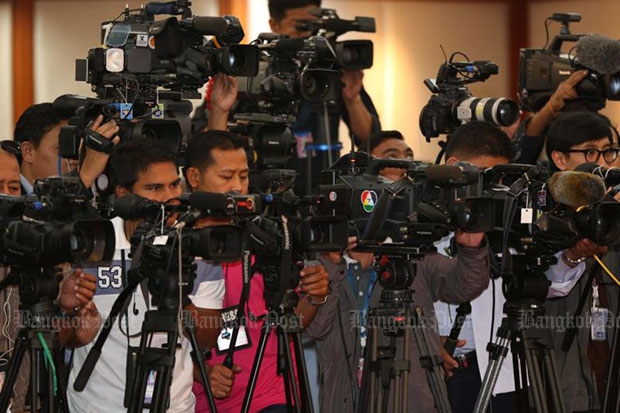
Concerned over its international image, the ruling junta has tightened its rules on foreign media working in Thailand, prompting the denial of work permits for some foreign journalists.
The move comes amid new attempts by the regime to buttress its image abroad.
Foreign correspondents and activists voiced concerns about the junta's restrictions on the press corp on Wednesday, after a foreign cartoonist -- who worked as a freelancer for The Nation newspaper for 16 years -- reported his work permit extension was denied on Tuesday.
Although his case can be resolved, it has become more difficult for foreign journalists to renew their media accreditation since the 2014 coup, said Jonathan Head, president of the Foreign Correspondents Club of Thailand (FCCT) and a BBC correspondent.
Freelancers are more vulnerable than established media outlet employees, he said.
"There's a lot more scrutiny now," he said, adding many journalists who underwent an interview to obtain their work permit for the first time have described the process as often "unpleasant" and "hostile".
The interview is tougher, with the Foreign Ministry officials asking the applicants for their opinions on the junta and the monarchy, and the required documentation is more stringent, he said.
More journalists are being told they are not eligible for a media visa and have to apply for a business visa instead, which is harder to obtain. At least five journalists have been refused media visas since 2014, he added.
The decision may seem arbitrary in some cases because the ministry usually does not provide explanations as to why they have been denied, Head said.
He said that for a small number of journalists, the issue has clearly been their news coverage of Thailand, which was perceived as too negative. It is a matter of concern for the FCCT that the content of a journalist's reporting is being used as part of the criteria as to whether they are granted a media visa, he added.
Media freedom activist Subhatra Bhumiprabhas compared Thailand's current press freedom situation to Myanmar's at the height of its dictatorship.
The Myanmar junta had denied work permits for foreign journalists or banned them from entering the country due to their critical reporting on the regime.
It is not surprising the government would deny foreign correspondents their work permits, she said. "The government is trying to limit the extent of negative reports and control its image outside the country."
Cyril Payen, a France 24 reporter based in Thailand for 15 years, said there is added pressure on foreign media since the coup.
Compared to other Asean nations, Thailand is a hub for journalists covering the region, largely due to its media freedom. However, he feels that this is no longer the case.
"When the junta keeps repeating that foreign journalists do not understand Thailand and cause political rifts, it is putting strain on our work," Mr Payen said.
According to Head, ministry guidelines and criteria for work permit applications will be made public next week.
He was told the criteria are not primarily connected to politics but about "balanced reporting".
"We are pleased that the ministry is now discussing the matter with us and hope these criteria will not be too restrictive," he said.
He said some work by freelancers and leisure writers is no longer considered daily mainstream journalism by the authorities, which was a concern.
Ministry spokesman Sek Wannamethee said on Wednesday the ministry has taken note of concerns raised by foreign journalists.